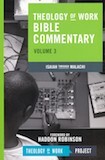Work for the Peace and Prosperity of the City
Daily Reflection / Produced by The High Calling
“And work for the peace and prosperity of the city where I sent you into exile. Pray to the LORD for it, for its welfare will determine your welfare.”
Jeremiah 29:7
In 597 B.C., many leading Jews were deported from Jerusalem to Babylon, including Jehoiachin, the king of Judah. While they were in exile, Jewish prophets began to promise a quick end to their captivity. So, in about 594 B.C., Jeremiah wrote a letter to the exiles in Babylon. This letter included the unwelcome news that the exile would continue for seventy years (Jeremiah 29:10). Thus, the Jews in Babylon should settle down in the place of their captivity, building homes, planting gardens, marrying and having children.
Moreover, the Lord said through Jeremiah, “And work for the peace and prosperity of the city where I sent you into exile. Pray to the LORD for it, for its welfare will determine your welfare” (Jeremiah 29:7). The exiles were not to pretend as if their stay in Babylon would be short. Moreover, they were not to undermine Babylonian society or foment revolution. God would overthrow Babylon in his time and way. Instead, the Jewish exiles were actually to “work for the peace and prosperity” of Babylon. The Hebrew translates literally, “Seek the peace [shalom] of the city where I have sent you.” The NLT renders shalom as “peace and prosperity,” and then later in verse 7 as “welfare,” to reflect the broader sense of shalom in biblical Hebrew. Shalom is not just the absence of conflict, but the flourishing of life.
Many of us feel as if we have been sent into exile in our lives. Perhaps some of us are literal exiles. But others of us find ourselves in places that don’t feel like home. We may be working for a company that doesn’t reflect Christian values. Or we may live in cities that are hotbeds for crime and corruption. Or we may even feel like we’re not at home in our own families. Jeremiah encourages us not to despair and not to give up seeking God’s peace. Though we may have little opportunity to impact major structures of our society, we can touch our neighbors and colleagues. We can work for justice in our spheres of influence. We can seek to be people of shalom in our relationships at work, at school, at home, and in the community. In this way, we honor the Lord during our time of “exile” from his kingdom.
QUESTIONS FOR REFLECTION: When have you felt like an exile? Where do you find it most challenging to live out your faith? How might you seek shalom today? What would it mean for you to practice shalom in your workplace, family, and community?
PRAYER: Dear Lord, I can only imagine how disorienting it must have been for the Jewish exiles when they received Jeremiah’s letter. They had been forcibly removed from their homes and dragged to Babylon. They were strangers in a strange land, dominated by a foreign tyrant. And yet you were telling them to settle down, to plant and build, to marry and have children, and even to seek the peace of Babylon?!
O Lord, help me to see how I can seek your peace in the places of my life. Give me wisdom to know how to seek your peace and prosperity in places where you are not acknowledged or even welcome. By your grace, may I be a true peacemaker .
I pray in the name of Jesus, who is our peace. Amen.






